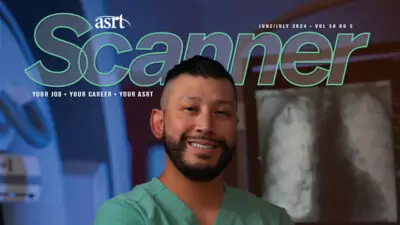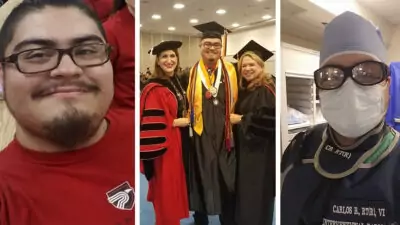Program Requirements
Prerequisite Courses (must be completed prior to application submission):
ENC 1101 College Composition I
MAC 1105 College Algebra
BSC 2085C Human Anatomy & Physiology I
BSC 2086C Human Anatomy & Physiology II
HSC 1531 Medical Terminology
It is highly recommended that the required additional general education courses listed below be completed prior to submitting a Radiography Program application. These courses, however, can be completed at any time during the 2-year program:
HLP 1081 Wellness Concepts or HSC 1101 Wellness Nutrition, Personal Growth, and Fitness
CGS 1061 Intro to Computers
PHI 2010 Introduction to Philosophy
POS 2041 American National Government or AMH 1010 History of the United States 1607-1877 or AMH 1020 History of the United States 1877 to the Present
RTE Program Core Course Sequence by Semester:
Please note each term consists of a combination of classes held at the Airside Center-West, Lakeland, and required clinic assignments at various clinical facilities. The clinic schedule (specific days/week and hours /day)will vary each term.
Spring Semester Year 1
RTE 1000 – Orientation to Radiologic Technology
RTE 1111 – Radiographic Nursing Procedures
RTE 1503C – Radiographic Positioning I
RTE 1804L – Radiographic Clinical I
Summer Semester Year 1
RTE 1513C – Radiographic Positioning II
RTE 1418 – Principles of Radiographic Exposure I
RTE 1814L – Radiographic Clinical II
Fall Semester Year 1
RTE 2523C – Radiographic Positioning III
RTE 1458 – Principles of Radiographic Exposure II
RTE 2458C – Radiographic Quality Assurance
RTE 2824L – Radiographic Clinical III
Spring Semester Year 2
RTE 2762 – Cross-Sectional Anatomy
RTE 1613 – Radiographic Physics
RTE 2834L – Radiographic Clinical IV
Summer Semester Year 2
RTE 2385 – Radiation Biology and Protection
RTE 2782C – Radiographic Pathology
RTE 2844L – Radiographic Clinical V
Fall Semester Year 2
RTE 2061 – Radiographic Seminar
RTE 2854L – Radiographic Clinical VI
Grading System/Scale
Grading policies are clearly stated in course syllabi, which are given to the student in the first week of class. The student must achieve at least a C grade in every radiography class and maintain a 2.00 college-wide GPA in order to remain in the Radiography Program.
The course grade will be determined by the following scale:
92-100 = A
84 – 91 = B
75 – 83 = C
70 – 74 =D
Below 70 = F
Radiography Program: AS-25570
Clinical Overview
A major strength of the radiography program is that students are able to rotate to several clinical sites. Such rotations increase students’ adaptability. Students may be assigned to six different clinical sites during the two-year program and must be prepared to travel to any of the program’s contracted clinical facilities. Distances from the Polk State College Airside West Campus range from approximately 9 miles to 76 miles. The Clinical Coordinator is primarily responsible for assigning students’ rotations.
A major strength of the radiography program is that students are able to rotate to several clinical sites. Such rotations increase students’ adaptability. Students may be assigned to six different clinical sites during the two-year program and must be prepared to travel to any of the program’s contracted clinical facilities. The Clinical Coordinator is primarily responsible for assigning students’ rotations.
The program recognizes the critical importance of clinical experiences and that absenteeism can significantly affect the skill level of its students. Attendance is monitored to assure the program, its accreditation agency, and its affiliates that all students have completed a designated length of clinical education.
Normal clinical hours are scheduled anywhere between the hours of 7:00 a.m. – 11:00 p.m., depending upon the clinical facility and the number of clinical hours required for each semester. Attendance is strictly monitored. Clinical attendance schedules are assigned by the Clinical Coordinator. Due to the demands of the clinical schedule, students should not work overnight hours. This presents safety concerns to everyone involved in the clinical process.
Students are required to complete mandatory rotations through advanced modalities and evening shifts. In addition, documented operating room hours are a required component of the second year. Advanced modalities rotations are to be two consecutive weeks, and evening shift rotations must be one semester in duration. The OR logs must document a total of 40 case hours. Students may request and begin specialty rotation assignments in additional modalities such as: CT, Nuclear Medicine, CVT, Sonography, Radiation Therapy, Mammography, MRI, and IR.
All clinical facilities require background checks and drug testing prior to students performing clinical experiences at their facilities. Furthermore, these clinical facilities may require additional background checks and/or health-related testing during the program. For that reason, Polk State College requires a background check and drug screen to be completed prior to clinical attendance for all radiography students; a second set must be repeated in 12 months. The total cost of both sets is approximately $330. The results of these tests must be received by the Program Director prior to the first day of clinical rotation.
All students are covered by a blanket liability insurance policy provided by Polk State College. This policy provides protection in the unlikely event students are named in legal action. Students will be provided insurance to cover accidents that occur in the clinical setting. This insurance is provided as supplemental insurance to their primary private insurance.




